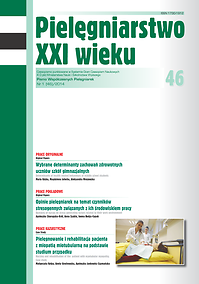The patient’s meaning of illness. The meaning-making model
Keywords:
meaning of illness, meaning of life, emotional crisis, meaning-making of illnessAbstract
THE PATIENT’S MEANING OF ILLNESS. THE MEANING-MAKING MODEL
Aim. The article has a review character. The purpose of the article is to show the role, which, during the adaptation of the patient to serious illness process, is played by the way of its understanding associated with patient’s desires, beliefs, and life goals. The article presents the stress concept by Crystal Park and Susan Folkman called the meaning-making model. The model is a supplement of Richard Lazarus and Susan Folkman’s transactional theory of stress.
Introduction. The meaning-making model is used to describe adaptation process of patients in the situation of illness seriously affecting the life. Illness and its treatment process can be for the patients a source of stress and emotional crisis. The transactional theory of stress and coping can explain the source of crisis if the dimension of meaning of illness is taken into consideration. In the meaning-making model, two levels of understanding are assumed: situational meaning, and generalized meaning (meaning of live). The discrepancy between the situational meaning and generalized meaning is the source of stress and emotional crisis. The article discusses the patient’s ways to cope focused on the creation of meaning, and the forms of changes in meaning of illness, and meaning of life. In conclusion, a short casuistic example is presented.
References
1. Taylor S. Adjustment to threatening events: A theory of cognitive adaptation. Am Psychol.1983; 3:1161-1173.
2. Baumeister R. Meanings in life. New York: The Guilford Press; 1991: 15.
3. Antonovsky A. Rozwikłanie tajemnicy zdrowia. Warszawa: Instytut Psychiatrii i Neurologii; 2005.
4. Yalom I. Psychoterapia egzystencjalna. Warszawa: Instytut Psychologii Zdrowia; 2008: 308; 433; 308.
5. Frankl V. Wola sensu. Warszawa: Wydawnictwo Czarna Owca; 2010.
6. Jacobi S, MacLeod R. Making sense of chronic illness – a therapeutic approach. J Prim Health Care. 2011; 3(2): 136-141.
7. Sęk H. Wprowadzenie do psychologii klinicznej. Warszawa: Wydawnictwo Naukowe SCHOLAR; 2007: 243.
8. Pilecka B. Kryzys psychologiczny. Wybrane zagadnienia. Kraków: Wydawnictwo Uniwersytetu Jagiellońskiego; 2004: 75.
9. Kubacka-Jasiecka D. Interwencja kryzysowa. Pomoc w kryzysach psychologicznych. Warszawa: Wydawnictwo Akademickie i Profesjonalne; 2010: 188; 197.
10. Motyka M, Załuski M. Choroba jako kryzys a zmiany rozwojowe podczas choroby. Pielęgniarstwo XXI wieku. 2010; 3-4: 99-103.
11. Heszen I. Teoria stresu psychologicznego i radzenia sobie. [w:] Strelau J (red.). Psychologia. Podręcznik akademicki, Tom 3. Gdańsk: GWP; 2000: 470.
12. Park C. Folkman, S. The role of meaning in the context of stress and coping. Rev Gen Psychol. 1997; 1: 115-144.
13. Park C, Ai A. Meaning making and growth: new directions for research on survivors of trauma. J Loss Traum. 2006; 11: 389-407.
14. Park C. Making sense of meaning literature: An integrative review of meaning making and its effects on adjustment to stressful life events. Psychol Bull. 2010; 136: 257-301.
15. Janoff–Bulman R. Shattered Assumptions: Towards a New Psychology of Trauma. New York: The Free Press; 1992.
16. Lifton R, Olson E. Ludzki wymiar kataklizmu. Nowiny Psychologiczne. 1987;5:86-107.
17. Davis C, Wortman C, Lehman D et al. Searching for meaning in loss: Are clinical assumptions correct? Death Stud. 2000; 24: 297-540.
18. Kopaliński W. Słownik wyrazów obcych i zwrotów obcojęzycznych. Warszawa: Wiedza Powszechna; 1975: 879.
19. Załuski M, Gajdosz M. Skala Założeń Wobec Świata – polska adaptacja i analiza walidacyjna. Psychoterapia. 2012; 3:17-31.
20. Ogińska-Bulik N. Pozytywne skutki doświadczeń traumatycznych. Czyli kiedy łzy zamieniają się w perły. Warszawa: Difin; 2013: 36-37.
Downloads
Published
Issue
Section
License
Copyright (c) 2014 Maciej Załuski (Autor)

This work is licensed under a Creative Commons Attribution 4.0 International License.




